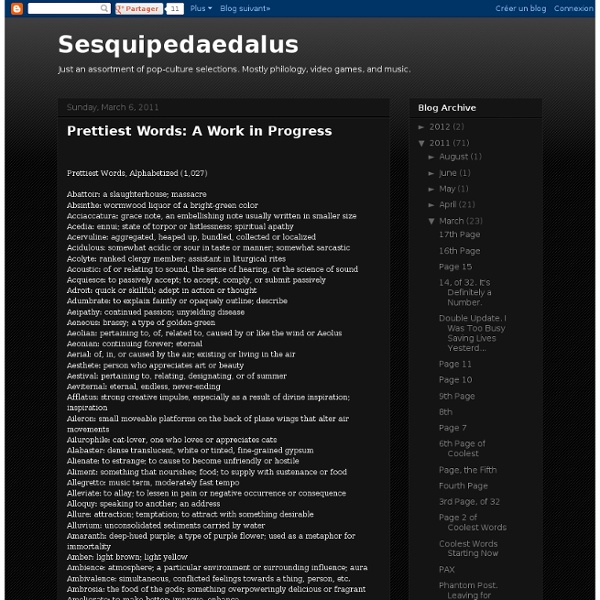The World's Most Spoken Languages And Where They Are Spoken
This beautifully illustrated infographic (above), designed by South China Morning Post’s graphics director Alberto Lucas Lopéz, shows the most spoken known languages in the world and where they’re spoken by the 6.3 billion people included in the study. Based on records collated from the database Ethnologue, the infographic illustrates the wide-ranging facts and figures of the world’s living languages catalogued since 1951. “There are at least 7,102 known languages alive in the world today. Twenty-three of these languages are a mother tongue for more than 50 million people. The 23 languages make up the native tongue of 4.1 billion people,” says Lopez on his infographic. “We represent each language within black borders and then provide the numbers of native speakers (in millions) by country.
Syllables, Scrabble Letters, and Picking Brand Names - Rich Barton
The Completely Ownable, “Made-Up” Consumer Brand Wins Long Term I wrote this as a private email in 2006 and just refreshed for the blog “Should we call our site something literal or should we make up a new word?” This is a question I often get asked by consumer product/service entrepreneurs. In light of Microsoft’s re-launch of Microsoft MSN Live Search as “Bing”, I thought it timely to re-fresh some old thoughts I’ve had about naming, words, and branding. It shouldn’t come as a surprise that I believe it is much more powerful long-term to make up a new word (e.g., Expedia, Zillow, or recently Glassdoor, 3 words that my teams have created) than it is to use a literal word (e.g., Travel.com, RealEstate.com, or Jobreviews.com).
List of French words and phrases used by English speakers
Here are some examples of French words and phrases used by English speakers. English contains many words of French origin, such as art, competition, force, machine, police, publicity, role, routine, table, and many other anglicized French words. These are pronounced according to English rules of phonology, rather than French. Around 28% of English vocabulary is of French or Oïl language origin, most derived from, or transmitted by, the Anglo-Norman spoken by the upper classes in England for several hundred years after the Norman Conquest, before the language settled into what became Modern English.
Holocaust Timeline
Jump to: 1938 1939 1940 1941 1942 1943 1944 1945 1933 January 30, 1933 - Adolf Hitler is appointed Chancellor of Germany a nation with a Jewish population of 566,000. February 22, 1933 - 40,000 SA and SS men are sworn in as auxiliary police. February 27, 1933 - Nazis burn Reichstag building to create crisis atmosphere. February 28, 1933 - Emergency powers granted to Hitler as a result of the Reichstag fire.
Wine tasting descriptors
Smelling is an important part of wine tasting; it is thought that much of perceived taste is due to olfactory receptors at the back of the nasal cavity. Aroma vs. bouquet[edit] A common aroma associated with the grape variety Gewürztraminer is lychee fruit. The technique of microoxygenation has an impact on the aromatic bouquet.[3] Components of a wine's aroma[edit]
The case of the missing “u”s in American English
Before you consciously became aware of your decision to read this article, your brain was already making the necessary preparations to click the link. There are a few crucial milliseconds between the moment when you’re consciously aware of a plan to act, and the moment you take action. This brief window is thought by some scientists to be the moment in time when we can exercise free will. It gives us the chance to consciously make a decision, suggesting we aren’t just slaves to our impulses. But, as the New Scientist reports, a study published in Neuroscience of Consciousness last year found that impulsive people have a shorter window of time between their awareness of an impending action and the act itself. Emilie Caspar and Axel Cleeremans from the Free University of Brussels asked 72 people to fill out surveys to determine their level of impulsivity.
Synonyms for words commonly used in student's writing
Amazing- incredible, unbelievable, improbable, fabulous, wonderful, fantastic, astonishing, astounding, extraordinary Anger- enrage, infuriate, arouse, nettle, exasperate, inflame, madden Angry- mad, furious, enraged, excited, wrathful, indignant, exasperated, aroused, inflamed Answer- reply, respond, retort, acknowledge Ask- question, inquire of, seek information from, put a question to, demand, request, expect, inquire, query, interrogate, examine, quiz
100 Exquisite Adjectives
By Mark Nichol Adjectives — descriptive words that modify nouns — often come under fire for their cluttering quality, but often it’s quality, not quantity, that is the issue. Plenty of tired adjectives are available to spoil a good sentence, but when you find just the right word for the job, enrichment ensues.
5 Ways to Give Yourself an Education That Kicks the Crap Out of the One You Got in School
5 Ways to Give Yourself an Education That Kicks the Crap Out of the One You Got in School One of the biggest reasons that people are denied the privilege of education is because they can’t afford it. However, today we live in a world where knowledge and information are at our finger tips like never before.
The 100 Most Beautiful Words in English
ere are the 100 most beautiful words in English. How do we know we have the most beautiful? They were chosen by Robert Beard, who has been making dictionaries, creating word lists, and writing poetry for 40 years. For five years he wrote the Word of the Day at yourDictionary.com and since 2004 he has written up 1500 words in the series, So, What's the Good Word? here at alphaDictionary. Below is a select list of his favorite words that he used in his poetry—or wishes he had.



